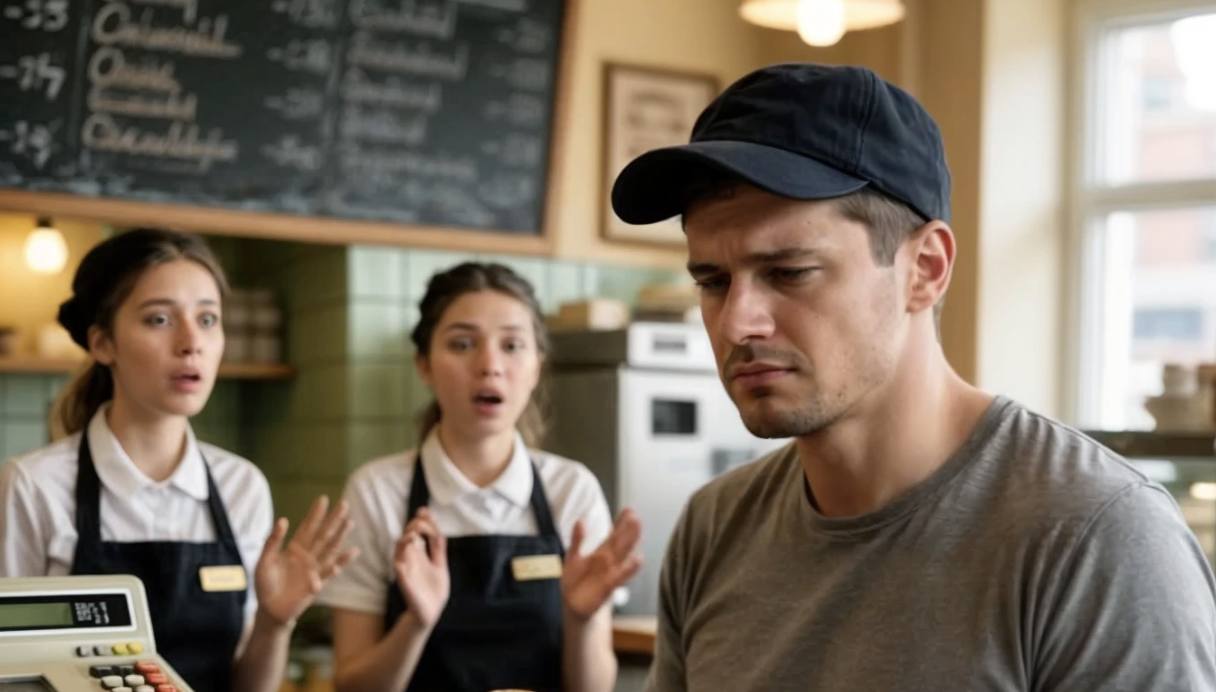The little bell above the door chimed softly, almost inaudibly, but that sound had always been special to him. Viktor Orlov stepped into “Orlov Café,” the establishment that had once been his dream and had since become a network of four locations across the city. He wore a simple dark jacket, worn jeans, and a cap pulled low over his brow. He had become one of many—an invisible guest in his own kingdom. Success, which had come fifteen years ago, had lifted him so high that he stopped seeing the ground, stopped feeling the heartbeat of his own creation. The latest reports were bleak: the numbers were dropping, even though the reviews still gleamed with five-star praise, and the staff turned over so quickly that Viktor no longer managed to remember new faces. He decided to come back. Not as the owner, but as a secret observer, to understand where the very soul they’d started with had gone.
He settled on a high stool at the counter, from where he could see the entire dining room. A young waitress with the bright name Alisa offered to seat him at a table, but he just shook his head. Here, at the epicenter of the bustle, he hoped to catch what slipped past the screens in his office. The kitchen buzzed like a stirred-up hive; the cook shouted out order numbers; the waitresses fluttered between tables with trays; the clatter of the cash register was a constant background. Everything seemed correct, well-oiled, but there was a crack in this perfect picture—unseen to the eye yet felt by the heart. Then his gaze fell on an elderly man at the large dishwashing station. He was lean, his hair the color of silver dust, and even amid that hell of steam and spray his movements remained measured and calm. Every plate, every glass found its place with a certain ceremonial precision. On his chest was a modest name badge: “Arkady Petrovich.”
“How long has he worked here?” Viktor quietly asked the cashier, a sharp-eyed young woman whose name—Svetlana—he read on her badge.
“Oh, he’s our local old-timer,” she smirked, counting bills. “Feels like he’s always been here. Honestly, he should have retired long ago.”
Viktor kept watching. Noise, commotion, shouts, steam—nothing knocked Arkady Petrovich out of his focused calm. When a young busboy noisily dumped a mountain of dirty dishes into the sink, the old man merely turned, smiled gently, and set to work without a single word of reproach. Regulars nodded to him as they passed, and he, in return, addressed many by name.
Near the end of the lunch rush, a young woman with two small children approached the register, nervously rifling through her bag. Viktor saw shame color her cheeks—she didn’t have enough for a modest meal. She murmured something, embarrassed, to Svetlana; Svetlana frowned and called over the second cashier, a young man named Denis. The voices immediately grew louder, sharper, irritation creeping into their tones. At that moment, Arkady Petrovich wiped his hands on his apron, walked over slowly, and, without a word, pulled a few worn banknotes from his pocket and handed them to the woman. Barely holding back tears of relief, she nodded, cast him a grateful look, and hurried toward the exit.
“That’s the third time this week,” Denis grumbled, slamming the cash drawer shut. “The old man’s lost it. He’ll beggar us all at this rate.”
“Yeah, and he spends the night in his junk heap out back, by the way,” Svetlana added with a caustic little laugh.
Those words pierced Viktor like needles. Over the next few hours he saw Arkady Petrovich not only washing dishes but also fixing a jammed coffee machine, helping arrange chairs, sweeping the floor, and twice—so discreetly no one noticed—slipping change into the till when a customer was short a few rubles.
“Why does he do that?” Viktor couldn’t help asking an elderly regular seated nearby.
“Arkady? He’s just a good man,” the patron sighed. “About five years ago his wife died of a serious illness. All their savings—everything—went to treatment. But he never complains. He comes in every day and works, though you can see it’s not easy for him. You won’t find many like him now.”
By evening, Arkady Petrovich was still at his post, scrubbing caked-on grease from the stove the cook from the previous shift hadn’t bothered to clean.
“Arkady Petrovich, you should head home—it’s already late,” said the manager, a woman named Irina, a hint of worry in her voice.
“In a moment, Irina Vladimirovna, just let me finish this,” he answered in his quiet, even tone.
And then Viktor noticed Svetlana and Denis exchange glances—one swift, eloquent look. A couple of minutes later, Svetlana began counting the day’s takings with exaggerated fuss and suddenly gasped loudly:
“It doesn’t add up again!”
“Another shortage!” Denis chimed in, his voice carrying across the room. “Third time this week! Three thousand forty-two rubles short!”
Irina frowned, her face turning stern. Arkady Petrovich lifted his eyes from his work, confused, his fingers clutching the edge of his apron. And in that moment Viktor understood everything. Crystal clear. His oldest, most loyal employee was being set up.
He left the café with a stony face and a heavy heart. He had come to find a glitch in the numbers and instead found rot in human souls. He would have to come back tomorrow. He owed it to himself to do so.
The next day Viktor again sat on his stool at the counter, hiding his face behind an open newspaper. Arkady Petrovich was at his station, but his movements were slower; he rubbed his wrist, mottled with age spots. Svetlana and Denis, standing by the coffee machine, traded low-voiced remarks.
“Hear that? The old man’s in his seventh year here. Seven years—and still washing dishes,” Denis snickered.
“Yup. And hands out money left and right. Sleeps in his car,” Svetlana added.
They laughed loudly, then dropped to a whisper to talk about the shortages.
“We know he slips his pension into the till to make the numbers line up, but Irina doesn’t. If the totals don’t match again, she’ll think he’s the thief,” Denis murmured with a cynical smirk.
“She’ll fire him. Then I’ll get my cousin in here, and you and I will get a hiring bonus,” Svetlana winked.
A chill ran through Viktor. That evening he quietly followed Arkady Petrovich. The old man reached a battered, timeworn Lada, coaxed the engine to life with a rattle, and slowly drove toward the outskirts. The car stopped on a vacant lot beside an abandoned gas station, where a small, rusty trailer stood. A dim light glowed inside. Through a curtain Viktor saw a narrow bed, a small table, and a hot plate. And nothing else. Nothing. A wave of shame and pain hit Viktor so hard he almost staggered. One of the most faithful people on whom his business rested lived like this—in poverty and solitude.
In the morning he spoke again with the same elderly patron.
“Arkady’s wife, Marta, died after a long illness,” the man confided softly, almost in a whisper. “He sold everything they had to fight for her. He’s still paying off debts. He sends money to his daughter in another city so she won’t worry and will think her father’s doing fine.”
Viktor felt something inside snap, like an overstretched string. Somewhere along the path to success he had lost the most important thing—the understanding of what all of this had been for.
The following morning he returned to the café once more. By then Svetlana and Denis were hardly hiding their scam, openly manipulating the register. And at that very time Arkady Petrovich again paid for a meal for the same woman with children, simply placing the money on the table next to her plate.
“Perfect,” Svetlana hissed with glee. “A couple more hundred for our ‘shortage.’”
Viktor’s patience broke. He stepped outside and made one short but very important phone call. The plan forming in his head was simple and stern.
The next morning the café opened as usual: the clink of plates, the aroma of freshly brewed coffee and golden toast, customers’ laughter. But this time Viktor walked in not in his old jacket but in a sharp, perfectly tailored dark blue suit, with Irina, the manager, at his side. When the bell above the door chimed, the conversations quieted, then died into complete silence. Svetlana froze with a coffeepot in her hand; Denis went sheet-white; Irina, eyes wide, barely breathed:
“Viktor Sergeyevich Orlov…”
“Good morning,” Viktor said calmly but firmly. “For the past few days I’ve been working here without revealing who I am. I wanted to see with my own eyes how my creation lives. And I learned far more than I expected.”
In the manager’s office he handed Irina a thick folder: printouts from surveillance cameras, detailed reports, several anonymous thank-you notes from customers addressed specifically to Arkady Petrovich. When they returned to the dining room, there wasn’t a trace of doubt in Viktor’s voice:
“Denis, Svetlana. You have systematically embezzled money, falsified reports, and tried to pin the blame on an innocent man.”
“Wait, this is some kind of misunderstanding…” Svetlana began, but Viktor cut her off sharply.
“No misunderstanding. I saw everything with my own eyes. You tried to destroy what was built over years on trust and honest work.”
Gathering herself, Irina stepped forward:
“You’re both fired. Effective immediately. With no severance.”
They left in silence, eyes down. A hush fell over the room, thick enough to touch. Arkady Petrovich stood at his sink, wringing a wet rag in his hands, his face a picture of bewilderment and fear.
“Viktor Sergeyevich… I didn’t take anything, I swear.”
“I know, Arkady Petrovich,” Viktor replied softly. “I know everything.”
“Then… why are you here?”
“To thank you. Publicly.”
Viktor turned to everyone present, his voice strong and clear filling the space:
“Everyone should know who this man is. For seven years he’s come here before anyone else and left after everyone. For seven years he’s not only washed dishes but fixed whatever breaks, helped those in trouble, and forgiven those who wronged him. And he’s done all this even when he himself often didn’t have a single ruble to his name.”
The room was dead silent; a few people lowered their eyes, ashamed.
“He lost the person closest to him; he lives in an old trailer on the outskirts; but he keeps working with a smile so his daughter, far away, won’t worry about him. That is true honor and dignity.”
Arkady Petrovich tried to say something, but his voice trembled and failed him.
“No need,” Viktor said gently, stopping him. “As of today, Arkady Petrovich, you are no longer our dishwasher.”
Everyone froze in astonishment, trading looks.
“You are our new assistant manager. With full salary, a company apartment in the city center, and a share of the café’s monthly profits.”
Arkady Petrovich went still, as if he couldn’t believe his ears. He looked at Viktor, and in his eyes surged a storm of unspoken feelings.
“I… I don’t deserve this…”
“You deserve it. Ten times over.”
At that moment the silence shattered into applause. Tentative at first, then louder and louder, rising to an ovation. Some regulars cried openly. And the old man stood in the midst of the people he had fed and helped all those years, and for the first time he saw that gratitude come back to him in such a pure, genuine form.
Later, as the sun tilted toward the horizon, tinting the sky a gentle peach, Viktor and Arkady Petrovich stepped out of the café together.
“Why did you do all this? Why did you come back?” Arkady asked quietly.
“Because I forgot what this business stands on. When I was just starting out, my father told me, ‘Treat everyone who works with you like family.’ You reminded me of those words—by the way you live.”
“My Marta… she always said kindness is the one treasure you can give away again and again, and it only multiplies,” Arkady whispered, gazing at the setting sun.
“She was absolutely right,” Viktor nodded.
He took a small envelope from his inside pocket and handed it to the older man.
“What’s this?”
“Keys. To an apartment on Sadovaya Street. And one more small document.”
With trembling fingers, Arkady Petrovich unfolded the paper inside. It was a deed. The plot of land where his old rusty trailer had stood for years now belonged to him. Paid in full. Years of restraint and endurance crumbled in an instant, and quiet, cleansing tears rolled down his furrowed cheeks.
“Thank you…” he managed. “I don’t know what to say…”
“Don’t say anything,” Viktor smiled, placing a hand on his shoulder. “Just keep being yourself. That’s more than enough.”
Two weeks later a large article appeared in the local newspaper under the headline: “Dishwasher Becomes a Hero. Owner Incognito Reveals the Truth About His Café.” People began coming not only for the good food but also for that special, almost homelike warmth that had returned to those walls.
One morning Viktor dropped by the café again. Arkady Petrovich, in a fresh, neat shirt, stood at the counter pouring coffee for a guest.
“Good morning, Viktor Sergeyevich,” he said, peaceful joy shining in his eyes. “We’re sold out again today.”
“As it should be,” Viktor answered, lightness in his heart.
They stood side by side, shoulder to shoulder, watching the first rays of morning sun cast golden gleams across the freshly washed floor. It was the same café—the same walls, the same tables, the same chime above the door. And yet everything was entirely different. And Viktor finally understood: he hadn’t come back to save the business. He had come back to find his own heart, which he had misplaced for a while. And he found it in the face of an old, wise man who taught him a simple, timeless truth: the strongest foundation for any endeavor isn’t concrete and steel, but the droplets of human kindness that, when they dry, leave on your hands an invisible yet everlasting scent of honesty.



